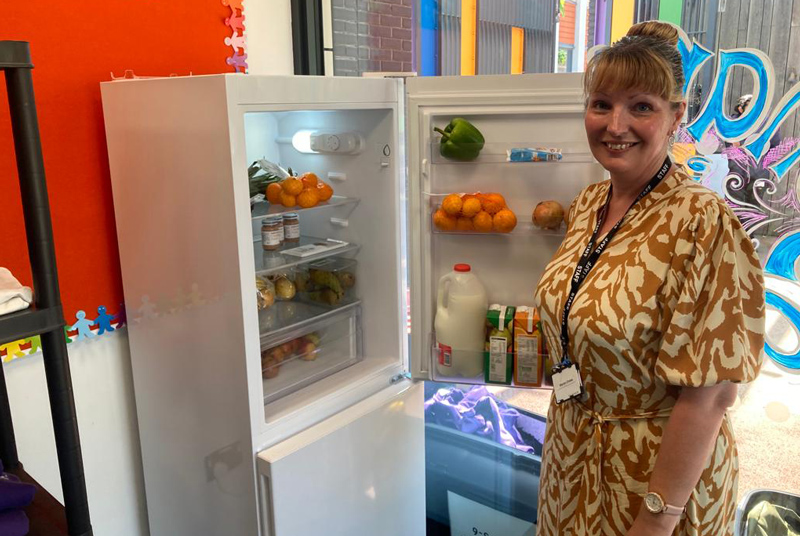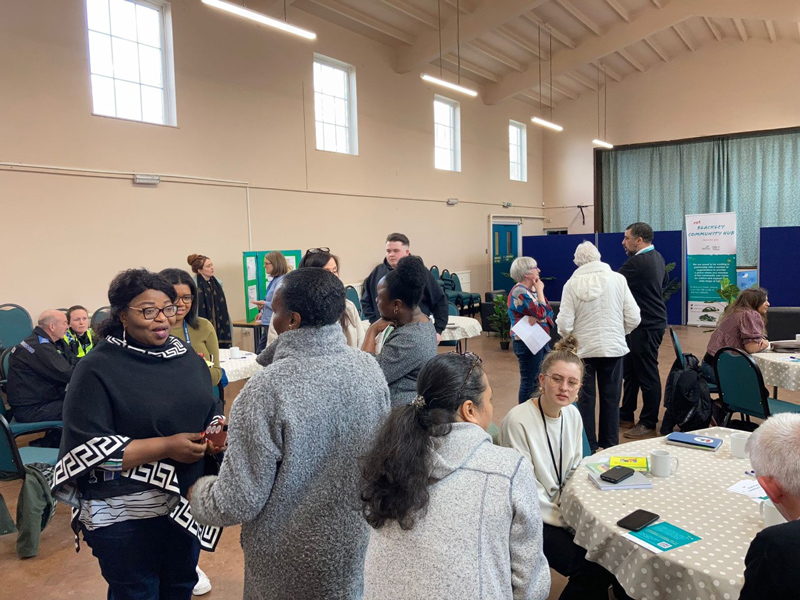School leaders have told the “heartbreaking” stories of pupils living without electricity, wearing dirty clothes that are too small and withdrawing from school dinners and clubs as the cost of living crisis bites.
Schools Week spoke to leaders across the country to uncover how even working families are now struggling to feed and clothe their children.
Despite inflation wrecking school budgets, leaders are launching their own foodbanks, uniform swap shops and hubs to help parents manage their finances – with one saying: “We’re now part of the welfare state.”
‘Tops are greyer and trousers shorter’
The spending power of families is falling at the fastest rate in two decades, as soaring energy and food costs outstrip income growth.
New figures last week show that nearly a quarter of pupils are eligible for free school meals – up a third since the pandemic hit.
Chantelle Lee, a parent at Tidemill Academy in south London, has been using the school’s foodbank since it launched in February.
Her energy bills are up £100 a month, with “everything” pricier in supermarkets.

“My universal credit only went up about £10. I know how to budget effectively, but it leaves me with hardly anything.”
At William de Yaxley Junior School in Peterborough, some “tops are becoming greyer, and trousers shorter”, says head Kay Corley.
Parents cannot afford to replace or wash clothes as much and ask if their children can wear trainers instead of buying new shoes. Six have asked directly for foodbank referrals since Easter – something that has never happened before.
Some children at Hexthorpe Primary Academy in Doncaster wear uniforms at weekends.
When pupils at Calthorpe Park School in Hampshire came to school dirty, staff found that the leisure centre showers they’d been using were out-of-service. Their parents could not afford to replace a broken boiler in their home.
Other families revealed their children with long commutes were absent because they could not afford fuel.
Meanwhile, several siblings at Illminster Avenue E-ACT Academy in Bristol were found to be living without electricity, and another without a cooker. Some asked to take home spare fruit.
Pupils missing breakfast
Parents are now cutting back on school activities they “perceive as a luxury”, such as music lessons, says Emma Jones, deputy head at Calthorpe Park.

Three schools say the uptake of after-school clubs has fallen, and two say more parents are swapping school dinners for packed lunches to cut costs.
Corley says ten pupils, instead of the usual “two or three”, did not go on a recent year 6 trip. The school also has had to “really chase for payments”, despite spreading them out and covering costs for pupils on free meals.
Forty pupils now use Tidemill Academy’s Greggs-funded breakfast club, up from 18 in December.
Nationally, the Magic Breakfast charity – part funded by the People’s Postcode Lottery – is supporting twice as many schools (1,000) in disadvantaged areas as pre-Covid, and twice as many pupils in each school (209).
The government this week snubbed its own food adviser’s recommendation to extend free school meal eligibility to all children with household incomes of less than £20,000 – an extra 1.1 million youngsters. Free meals are currently limited to parents earning under £7,400.
Lindsey MacDonald, Magic Breakfast’s chief executive, echoes the warnings of four heads that working families who “just about managed” are now struggling.
At least four William de Yaxley pupils ineligible for school meals regularly tell its head “they’ve not been fed breakfast”.
Ruth Perry, the head of Newall Green Primary School in Manchester, says parents in minimum-wage jobs cannot cover their bills or school meal costs. The school has stepped in to subsidise lunch and breakfast.
‘Wealthiest’ area feels pinch of cost of living crisis
Problems are not limited to poorer areas. Calthorpe Park is in Hart district – in 2019 judged England’s least income-deprived area.
“We’ve got children hungry, in dirty uniforms or without basic equipment – and yet we’re in one of the most privileged parts of the country,” Jones says.
Hart Foodbank fed 259 children between April and June, compared with 206 in the same period in 2019.
Jeni Harrison, head of Hexthorpe Primary, says that while hunger affects learning, incorrect uniforms impact how pupils see themselves”. Watching their parents struggle can also affect their mental health.
Tidemill Academy’s inclusion group meets to discuss supporting pupils, and to help each other – with some staff witnessing “heartbreaking” things.
E-ACT’s counsellor “supervision” sessions run for safeguarding leads at Illminster Avenue help head Felicity Hawkins “make sense” of what she sees. “You think – is what we do enough?”
Schools become one-stop shop for services
Tunde King, E-ACT Blackley’s new social resilience co-ordinator, says increased mental health problems amongst parents left many “scared to search for help”.
His school is one of many stepping up with new forms of support, going way beyond a school’s conventional role.
Head James Hughes hired King last year, prompting the launch of a new “hub” in April.

The school lacks space, but families can find housing, welfare, addiction and other service representatives at twice-weekly sessions at the nearby St Paul’s Church.
It also runs ten-week programmes aimed at families “cut off from services and even family activities” during Covid – helping with budgeting, cooking, bills and meeting families with similar experiences.
“We thought unless we do some preventive work, we’ll be putting on sticking plasters forever,” Hughes says.
Schools launch own food banks
Meanwhile, many schools are no longer referring parents to foodbanks, but launching their own.
Sir Hamid Patel, the chief executive of Star Academies, says a quarter of schools run them already, but they will be in all 31 from September as family circumstances are expected to “worsen”.

An “increasing number” of families depend on the banks, with the trust and schools fundraising to cover the growing gap between demand and donations.
“Helping to alleviate food and fuel poverty will remain a key trust priority for the foreseeable future: children cannot learn well if they are hungry or anxious,” Patel says.
Tidemill Academy recently became the latest REAch2 primary to launch a “community fridge” alongside its food cupboard. It tops up donations with £50 of supplies weekly.
It is open during school hours, with 20 parents typically using it on a Friday.
Stephanie Skierlo, a Tidemill parent, says she once had a “nice life” working in finance, but mental health problems forced her on to universal credit. “You can’t judge somebody.”
‘It’s a plaster – not a long-term solution’
Several schools say they are now regularly providing uniforms, secondhand or new. Hexthorpe Primary Academy – which has about 400 pupils – has issued 154 this year.
Gemma Trattles, an associate executive principal at Outwood Grange Academy Trust, says uniform requests through its hardship fund have increased in its northern schools. They are no longer just “one-off loans until pay day”.
Corley says William de Yaxley is also “providing uniforms for different reasons now – not because of scabby knees, but because we’re going: ‘that looks short’”.

Other schools are subsidising meals and activities or “having to advocate for families and broker support” from other services, as Jones puts it. “We’re happy to, but boundaries have become blurred.”
Perry agrees: “We’re putting a plaster on; it’s not a long-term solution. But for as long as we do, we’ll be expected to.”
King says the hub at E-ACT Blackley makes him feel “like I am part of the welfare state”, prompting “serious questions about the government’s role in the true meaning of it”.
School budgets squeezed
But these extra services mean extra costs.
Marion Drake, Tidemill’s head, says maintaining its food cupboard and fridge is a “massive task”, while budgets for other needs have become “tight”.
“We’ve got a rich curriculum. We don’t want to drop it, but it’s a constant balance.”

Perry says Newall Green’s energy bills have jumped by “the equivalent of four teaching assistants”, while the school has a “printing ban” as paper costs double.
Corley says fuel prices pushed up coach costs for a recent trip, while income from fundraising activities has fallen.
Clothing donations have similarly dropped at Hexthorpe Primary.
This week the funding rate for universal infant free school meals has been raised to £2.41 per meal – an increase of 7p. It increases nnual per-pupil funding from £444.60 to £457.90.
Nadhim Zahawi, the education secretary, says the £18 million rise recognises the rising cost of living. But it equates to about just 3 per cent. Inflation hit 7.8 per cent in April.
Dr Patrick Roach, the general secretary of the NASUWT teaching union, says: “Without increased investment in expanding free school meal eligibility and action to tackle the cost of living crisis from this government, many more pupils risk having their health and welfare damaged.”
‘Going hungry will cost children their future’
Haider Nasser, the head boy at Carlton Keighley, near Bradford, has been gathering signatures for the Magic Breakfast charity’s petition to spend £75 million more on school breakfasts in deprived areas. Youth campaigners will hand it to Downing Street next month.
Magic Breakfast makes a “better, brighter atmosphere” at his school, he says, helping people to make friends and allowing pupils to take home leftover bagels.

At a recent staff meeting the 16-year-old highlighted the reality of many of his peers’ lives.
“As head boy I see lots of things. Some students don’t have meals at weekends. The cost of living’s made parents work double shifts and longer hours.
“I know lots choose between feeding children and having a roof over their heads. It’s inhumane.”
He plans to start working part-time alongside his studies next year “to support myself financially”.
Asked what he’d tell Boris Johnson if he had the chance, he said: “He needs a huge focus on deprived areas as we’ve been forgotten. The attainment gap’s got bigger since the pandemic.
“Someone said if levelling-up fails in Bradford, it fails everywhere. There’s huge gaps in the levelling-up scheme – it doesn’t talk about children and breakfast.
“If the only thing children have on their mind is food, how are they going to progress? One day they might become something great, but it’s going to cost children the future they have if they’re hungry.”








You could start by making uniform voluntary. There is no legal basis for compulsory uniform in the State Sector. By all means have clothes’ banks. But not because the School only teaches uniformed children. Come on MPs, the buck stops with you, not the Superheads. So long as kids are reasonably dressed, as in almost all countries, what’s your problem?
I was reflecting on this and although this is controversial, compared with prisons schools appear to expect parents to supply almost everything from food, to clothing, enrichment activities, books and technology. It would be useful to know the budget allocation for prisons compared to schools as you don’t hear much about their cost of living crisis and heating bills. All inmates wear a free uniform, get free meals and enrichment. What is the message we are sending children if we cannot invest in their futures, especially when poverty is out of their control?